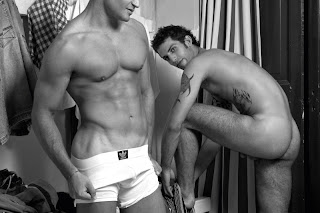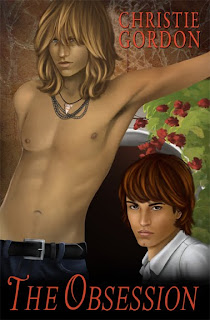So before I begin this discussion, I suppose I need to define what constitutes “M/M Romance” and “Yaoi”. Of course, by setting a definition I may very well answer my original question;) But here goes:
M/M Romance: This is usually defined as women writing homoerotic romances for women. It usually comes in book form – short stories, novellas or novels. The covers of the books are made up of largely half nude, buffed men. The covers are also done with photo-manipulation. They are usually like hetero romances in there are genre’s like historical, paranormal with werewolves and vampires, contemporary, fantasy, steampunk, whatever. The main characters are everything from cops to cowboys to wealthy business men to military men and all in-between.
Yaoi: This is also usually defined as women writing homoerotic romances for women. It most widely comes in manga or comic form, although there seems to be a trend outside of Asia to produce it in regular book form. Many of them are also made into anime. The genres pretty much run the gamut of paranormal, contemporary and fantasy, except that many of the main characters are high school or college students and many are what we’d consider “underage” in the USA. A very popular theme in Yaoi is the older man/underage man.
I suppose if you look at my definitions (they are by no means all encompassing or exactly right;) ), I think there are some clear differences. In my experience, M/M romance tends to try and stick to real issues involving gay relationships way more than Yaoi does. But since it’s written by and for women (and yes, I understand many men read it, but it’s still written for a female audience. Football ads target young men and I still watch them and find them amusing – sheesh) there is an element of romantic emotion between the two men that isn’t quite realistic and you probably won’t find written in a real, bona fide Gay Romance novel (written by and for gay men).
I tend to think Yaoi takes this romantic emotion thing a bit further. Maybe the men don’t really act like real men – but dang, we’re surrounded by real men all the time, can’t we just have some made up men that act how we’d like them to act for once? But the trick here is not to make them so farfetched that they’re completely unbelievable. It’s all about what we want, right? I think I’m off on a bit of a tangent, LOL.
Of course, there is what I write, a mixture of Yaoi and M/M romance. I take the sort of characters and situations you’d find in a M/M romance and give it a bit more of that Yaoi romantic emotion. At least, that’s what I try to do:) There are others like me who write normal books (not manga) and have anime-style, hand-drawn covers. Maybe if some of you other authors come across my ramblings you can pipe in:)
Anyhow, in my very short analysis, I think I’ve determined that yes, there is a difference between Yaoi and M/M Romance. But I believe the lines between the two are being fudged into gray and morphed the more popular these genre’s get outside of Asia. And I also believe it’s great for us women (and men) who love both genres.
What do you prefer and what do you want to see more of?





I pretty much agree with what you say here, except that yaoi is more popular as novels in Japan. We just don't get many over here because they cost so much in time and money to translate. And that's sad because a Japanese friend keeps telling me about all the good novels she's reading. 🙁
I prefer books that lean toward yaoi. If I want realistic gay romance, I read romance written by gays (who seem to have more of a sense of humor than most mxm romance writers, whose works overall seems positively dour). I've not read one of your books, but it seems like something I might enjoy. Yaoi and mxm written by women are about fulfilling women's fantasies, and I'm not afraid to admit that and declare that I like my men pretty, emotional, and the stuff of my dreams.
Shelly_LR
*nods nods*
I think a lot of my writing straddles that Yaoi/MM line, too. This may sort of veer off topic but I wonder if cover styles attract different readers and lead to different opinions of stories.
Example: Does a hand draw or anime style cover tell readers they're in that fantasy/reality land of yaoi where the "rules of romance" tend to be flexible while a photo manip gives them the expectation of more real world events and and characterization?
Does my rambling make sense to anyone but me? ^_^
I think it's true that the lines between the two genres are blurring. Even in the last few years, I've been seeing changes. Yaoi with older characters and slightly less adherence to some of yaoi's conventions (such as seme/uke roles). Or M/M that's a bit heavier on the romance/mushy side.
Interesting that the same thing seems to be happening in a lot of other genres, as well. Fantasies with more romance, or straight romances that have much more plot that has nothing to do with the romance. That sort of thing.
Re: Barbara's comment – I definitely get a different feel from a book cover based on whether it's drawn or photo. Usually, I assume the anime style covers may be a bit more romantic, and involve sexual situations that are monogamous. Real men on the cover are…well, hotter, LOL. But I also tend to assume that there may be more possibilities for sex between a main character and a non-love interest. I don't automatically assume that it will be a 'romance,' even if it involves romance, if that makes sense?
I'm not sure that this perception is really held out by experience, but if I had to analyze my thought process, that's definitely the way I'm thinking it through.
Agreeing with Barb. My Blue Ruin series bears a certain amount of raw realism, like Blue's dad throwing him out of the house upon discovering Blue us gay. But because it's very yaoi-influence, I go waaay out there with the high camp fantasy in that Derek and Blue find themselves in highly unrealistic situations. And then there's Derek and Blue themselves, who are very pretty with fabulous hair in unrealistic shades of the rainbow. LOL
While my more M/M-oriented work embodies a certain amount of romantic fantasy, I definitely keep things more realistic. With the yaoi I say anything goes, though do worry that readers who don't understand or appreciate yaoi (or even plain old manga) miss out on some of those finer nuances. (Like the people who ask we yaoi writers why we have "cartoon covers"???) I suppose that's where the more M/M elements can at least make the story accessible. Definitely a balancing act!
Anon – I have seen the Japanese Yaoi novels, but I didn't know how popular they were. I wish we could get ahold of them! And totally agree, obviously, that I don't necessarily want "real" men in my romance novel! If I wanted that, I'd just go to the local bar more often, LOL.
Barbara – I definitely think a hand drawn cover would attract a more yaoi-prone crowd and the photo covers attract the strict (If you can call it that) M/M crowd. I actually try to shy away from a full on cartoon look and make my drawn covers more realistic just so it appeals to both somehow (well, that and my lineart sucks, LOL). Hey – I found an author who has Heise doing her Yaoi-M/M covers! I about died. How the heck did she get ahold of her? I digress…I do LOVE Anne Cain's work as well:)
Twisted – Yep, I agree the genre's are all mixing up as the it all matures. I've read a M/M Romance book or two where there was maybe one sex scene…at the END…and I felt…cheated. If that's it, then don't call it M/M "Romance". There's more sex than that on the average drama on TV for crap sakes.
Katrina – Ditto;)
Christie
I think your assumption that all gay romance is mostly for women is way off. I know a lot of gay men read m/m romance, especially the genres that aren't "just" romance (Josh Lanyon's mysteries, for instance), but I don't know any gay men who read yaoi and I know several who think it's totally unrealistic. I tend to agree.
Personally, I don't care for yaoi at all, and I wish Amazon would give yaoi its own category. It's about as realistic as "True Romance" comics are realistic about hetero romances. I do not think that the two genres are at all alike.
Actually, DMP (Digital Manga Publishing, whose yaoi subsidiaries are known as June and 801 Media) has translated at least a dozen yaoi novels now, possibly more. The problem is that Japanese is such an elliptical language that it can be pretty tricky to translate it in any way that doesn't look or sound distractingly odd in English. The first yaoi novel DMP translated was the schoolboy romance "Only the Ring Finger Knows." They had already published the manga adaptation of the first novel in the four-book series, which apparently sold well enough that they thought it was worth trying to publish translations of the novels, too. But the translation they commissioned was so literal that the first book wound up riddled with sentences like "Wataru didn't want to cause trouble for Yuichi, but."–with a period after the "but." You can't do that in English–it just looks mindbogglingly weird. If you want to have the sentence just sort of trail off at the end, which the original Japanese author apparently did a lot, the correct English-language punctuation for that is an ellipsis (…). But either the translator DMP had hired somehow didn't know that, or he or she was counterproductively anxious not to deviate from the Japanese even by adjusting the punctuation to its appropriate English equivalent instead of replicating it verbatim.
The more recent yaoi novels DMP has published seem to have smoother translations. The last one I read, "Gentle Cage" (it's about an art student whose budding romance with a fellow student is derailed for several years when a family crisis forces him to accept a famous artist's offer to pay his mom's hospital bills if the student will come live with him and be his muse–without explaining what happened to his existing about-to-be-boyfriend, or ever contacting him again), actually read pretty smoothly in terms of its prose. Of course, it still had the typical yaoi cracktastic situations that had me repeatedly exclaiming, "Why would anyone put up with being treated like this?" and "Why doesn't he just tell him what really happened?," etc., etc. Somehow these situations tend to be a bit less headbashingly infuriating in manga form. If only because if it's a manga, even if the uke manages to find some way to make excuses for everyone else's horrible behavior and/or blame himself for everything (which happens improbably often in such stories, at least from a Western standpoint), there are usually only a dozen or so panels devoted to it, rather than the pages and pages of exasperatingly Patient Griselda-ish prose dedicated to portraying this viewpoint in a novel.
If only more people would read this!